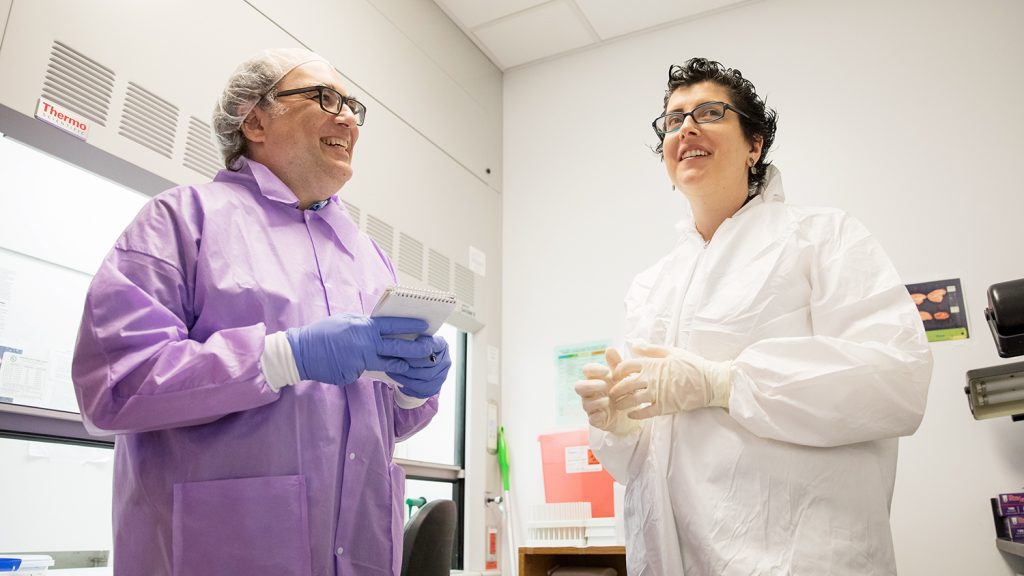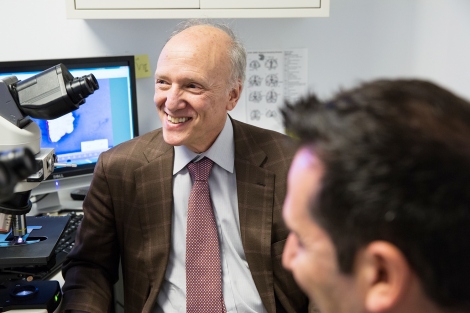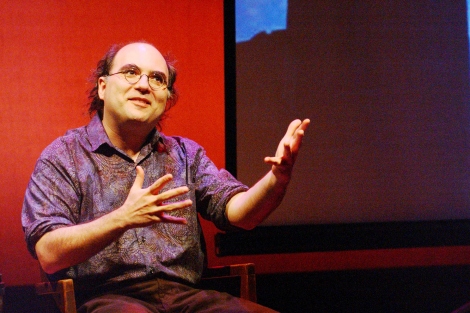A Laughing Matter: SF Comedian Looks to Tell the Stories of Dementia Patients, Caregivers
Resource type: News
University of California San Francisco | [ View Original Source (opens in new window) ]
Josh Kornbluth is Among the Global Brain Health Institute’s 32 Inaugural Atlantic Fellows

By Mitzi Baker
Failing a calculus class and grappling with tax issues made comedian Josh Kornbluth very unhappy, so he created and performed comedic monologues about the topics to feel more in control of his life.
Now he is tapping into that type of storytelling for dementia patients and their caregivers at UC San Francisco.
“So much of these people’s lives are dominated by their struggles around dementia,” said Kornbluth. “I feel that shaping these experiences into a story that they can tell and re-tell, that others can enjoy, gives a gratifying measure of comfort and satisfaction.”
Kornbluth is one of 32 inaugural Atlantic Fellows at the Global Brain Health Institute, a collaboration between the Memory and Aging Center at UCSF and Trinity College, in Dublin, Ireland.
“My monologues are ways of dealing with really serious topics through comedy,” said Kornbluth, who draws not only from his own life events, but also from his observations during his recent stint as artist-in-residence at a San Francisco hospice.
During his year as a GBHI Fellow, Kornbluth is using his techniques to develop a one-man show on the subject of dementia. In addition, he will help members of an early-onset dementia support group – those suffering from dementia and their spouses – to develop and perform their own autobiographical tales.
“Telling stories can be a creative act that people can do during a time of enormous difficulty to show their humanity and individuality and retain their vitality,” he said.
Bringing in Fellows to Spread the Message
The Atlantic Fellows at UCSF and Trinity College include activists, lawyers, ethicists, economists, journalists, musicians and even an animal therapist. They are taking a range of classes and pursuing projects with the goal of returning to their communities with knowledge and skills to implement changes impacting brain health.

The wide range of the fellows’ disciplines – many of them decidedly nonscientific – illustrates the GBHI dedication to transforming the world’s perspective on the aging brain and what can be done to prevent dementia, said Bruce Miller, MD, a behavioral neurologist and director of the Memory and Aging Center at UCSF who leads the GBHI initiative with Ian Robertson, PhD, a neuroscientist at Trinity College.
“We think the way to get society to change is to train not just neurologists, psychiatrists and geriatricians but interprofessional leaders,” he said, to convey the message that cognitive impairment, which disproportionately affects the poor, has many causes that are preventable.
GBHI launched in 2015 with a $177 million donation from the Atlantic Foundation. The gift underscored the commitment of Atlantic and its founder, Charles “Chuck” Feeney, to address global challenges with big, bold initiatives that will serve society for generations to come.
“GBHI is focused on idea that a major health epidemic facing the world is dementia and that we need to focus first on the low-hanging fruit, which is dementia prevention,” said Miller. “Around 30 percent of all dementia cases might be prevented if we had systems set up in our societies that focused on brain protection.”
Beyond Scientists
A number of measures can help prevent dementia, including managing cardiovascular risk factors, such as high blood pressure and lifestyle risk factors, such as diet, sleep, exercise and smoking. GBHI is addressing all of these aspects through research, improved health care delivery and policy change, but the Atlantic Fellows provide an invaluable service in disseminating the findings to society globally, said Miller.

“Scientists alone are not going to be able to convey our message without the help of artists and other people who have the passion to communicate the ‘story’ of dementia,” he said.
Telling stories and helping others tell their own is Kornbluth’s contribution to the GBHI mission. “We all live by our stories, and people who have dementia are losing their stories,” he said. “The disease is changing the narrative of these people’s lives, their families’ lives and the lives of their communities.”
His goal is to develop public performances that connect the concept of aging with dignity to education about research being done on brain disease – to provide both a therapeutic outlet for those affected by dementia and an enlightening experience for others.
These stories he develops will be performed in front of UCSF audiences, and the public locally. Later, he intends to take his show across the nation and worldwide.
“I think it is my mandate from being accepted at GBHI to spread the word as far and wide as I can about the importance of brain science and policy related to it,” he said. “If I can tell entertaining stories about the amazing people that I have met here, that might disarm the general public and pull down some of the barriers of fear and terror that prevent us from dealing with dementia.”
The Atlantic Fellows program at the Global Brain Health Institute provides innovative training in brain health, leadership, and dementia prevention to a broad array of promising leaders from various professions, including medicine, science, business, law, journalism, and the arts.
The Global Brain Health Institute is an Atlantic grantee.